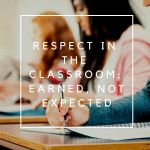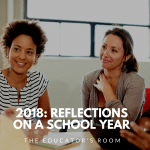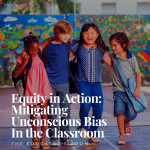Have you signed up for The Educator’s Room Daily Newsletter? Click here and support independent journalism!
by Amy Bradley
My son, a first grader, can’t wait to tell his teacher and classmates about his Winter Break fun! We got new foster kittens, went on a few outings together, and snuggled up in our warm living room when it got bitterly cold outside. When it warmed up enough, we all bundled up in winter gear that fit us to enjoy sledding and trekking around the neighborhood. We talked to multiple friends who had just returned from Disney World. We ate special foods.
Many of my colleagues probably had similar breaks with warmth and comforts. But when I go back to school next week, I will not assume that my students had any of these experiences. I will not ask any student, “How was your break?” because I know that many of them cannot casually answer that question with a few simple words or anecdotes. I have had enough of the long conversations following breaks to understand what every teacher should know: school is often the break – from hunger, cold, boredom, and other hardships.
Family homelessness looks different across the country, but many aspects of the experience are shared. Teachers and educators will relate best to all of their students if they grasp some common situations that homelessness can present.
1. Families often get kicked out of a shared living arrangement after major holidays, so some students will be newly settled in a shelter after break.
People open their homes to others for limited times, and post-holidays are often when that arrangement expires.
How does this inform us when we return to the buildings? We can observe any changes that may have occurred in our students and make sure to connect them to helpful resources. For example, if a student has moved to a shelter, you may connect them to your local Homeless Liaison for transportation and other assistance.
2. Food was likely irregular.
Some shelters serve food three times a day, predictably. It is also often the case that food is only to be accessed at specific times and that residents need to be gone from the building all day. This means that lunch may be skipped and that dinner could be during a parent’s work schedule and gets missed. Snacks are often prohibited to keep any pests away, so it can be challenging for families to navigate regular eating while in a shelter.
For those living in hotels, it can be difficult to prepare or store food. And for people who are “doubled-up” or living with others, they may not be allowed to access all of the kitchen spaces or equipment to avoid irritating their hosts.
What can we do about this when our students return? Most schools connect kids with breakfast and lunch, but if your school’s system needs a tune-up on making sure kids eat (say, when a bus is late), keep an eye out and get them fed. If you’re a first-period teacher, make sure they’re eating.
3. Many typical winter activities are difficult for families experiencing homelessness to access.
Sledding and building snowmen are for those with quality, fitting gloves and boots to wear in neighborhoods where caregivers feel safe to have children play. Even things like special light displays require payment and may not be a common sight for your students. When families are experiencing homelessness, they may not be able to afford the winter gear and decorations because the focus is on providing more basic needs.
Inclusive Alternatives to “How was your break?”
To be inclusive of the varied experiences my students had, I will not ask, “How was your break?” but will instead say, “It’s great to see you” or “I’m glad to be back with you all.” I may follow up with “Did you do anything special?” to be inclusive of all sorts of possible responses. If I ask students to share something from the break with the class, I make it broad, such as “tell about someone special you saw over break.” At least while they’re in my classroom, we can keep the focus off of gifts, trips, and other experiences that can exclude some young people. By asking more inclusive questions, everyone is better able to connect with each other.
Students and families who experience homelessness live in communities across the country. They live in cities and rural towns. They’re in basements of relatives, garages of the willing, stuffed into small hotel rooms, or on cots at the shelter. They are your students.
As we prepare to go back to our schools after the new year, we need to be mindful of what “break” has meant to others. We can watch for changes in our students, get them connected with school food and use inclusive language and activities to avoid alienating those who experienced homelessness and other hardships.

Editor’s Note: If you enjoyed this article, please become a Patreon supporter by clicking here.





